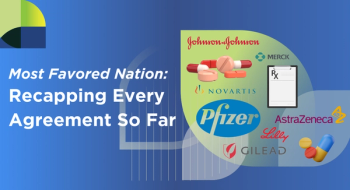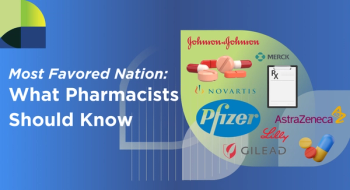
Pharmacy Practice in Focus: Oncology
- December 2014
- Volume 1
- Issue 6
Adequate Reimbursement: A Tipping Point for Pharmacy
The health of the profession of pharamacy depends upon pharmacists being fairly reimbursed for products and services provided.
The health of the profession of pharmacy depends upon pharmacists being fairly reimbursed for products and services provided.
There is no doubt that, as pharmacists, we should always strive to help our patients in any way possible to have better outcomes and better health. In this vein, I would encourage pharmacy as a profession to pursue the goal of provider status to enable pharmacists to work more closely with other health care professionals in finding the best pharmaceutical or nonpharmaceutical regimen for each patient.
However, I think it is absolutely critical that pharmacists, as among the most respected health care professionals year in and year out, do whatever is necessary to preserve our profession as we know it. The continued large-scale commercialization and commoditization of traditional pharmacy practice may damage the profession beyond repair.
A Death Spiral
I have noticed over the last 2 decades a steady decline in the regard given to the profession of pharmacy by the payers reimbursing us for our products and services. No longer are insurance companies (or more accurately, the pharmacy benefit manager mercenaries they hire to reduce drug costs) seeing the value pharmacists provide to their patients in managing their medications and health states, but rather, they are looking for the absolute cheapest price for each and every drug, without due regard for the important investment in overall health status and risk reduction that pharmacists represent. It is truly a situation of “cutting your nose off to spite your face,” except in this circumstance, it’s the patient’s nose being cut off, and the payer gets a tidy profit regardless of how the face looks at the end of the day. Unfortunately, this trend does not stop with a low but fair price for medications, but has eroded pharmacy to the point where pharmacists and pharmacy owners are selling their goods and services at prices that would be infeasible, indefensible, and impractical in any other well-functioning retail marketplace, whether the product was shoes, furniture, or hamburgers. If this trend is not reversed, the profession of pharmacy as we know it, and as young pharmacy students envision it, will no longer exist.
What Good Is Provider Status Without Patients?
Since this is an article about provider status, you might wonder, why all this discussion over reimbursement and the erosion of pharmacy? Shouldn’t this be a “good news” article? Shouldn’t this article be a positive account of what provider status will do for our profession and our business? I would say yes, except for the fact that the profession of pharmacy has done so little over the last few decades to protect and maintain the business of pharmacy. After all, we are health professionals, not businesspeople. What I see in the current push for provider status is an attempt to fix a crumbling house by building on an extra room, while the better course might be to repair the foundation, remodel the first story, and only then continue forward by adding on a second story, resulting in a profession that is well rounded, fairly respected and reimbursed, and more open and available to the occasional entrepreneur who wishes to hang their shingle. What good would provider status do for a community pharmacist if below-cost reimbursement prevents him or her from dispensing to patients? Without adequate reimbursement, there are no patients. Without patients, there is no services revenue.
A New Day and a New Set of Consumer Expectations
I believe it is absolutely critical that before we proceed a step further, we must come together as a profession and commit ourselves entirely to restoring our profession, and subsequently our business, to the level of autonomy and prosperity we once enjoyed. It seems self-defeating to offer additional valueadded services, like those conceived of through provider status, without shoring up the foundation. The dispensing and evaluating of current medication use for patient-centered optimization opportunities is impossible with the continued devaluation of traditional community pharmacy services.
I Hate to Say It, but Europe Is Actually Getting This One Right
As I write this article, I am on an airplane returning from a business trip in Germany where I attended the largest pharmacy show in Europe, ExpoPharm. The United States could definitely take some pointers from its sister countries overseas when it comes to the business and profession of pharmacy. In Europe, we see in pharmacy the “tailor-fitting” of medications, a high value placed on the traditional pharmacy services, and a regard for the medications dispensed at a level wholly separate from that given to candy bars, hamburgers, and T-shirts. In Europe, pharmacy is not a commodity, but rather a high-level professional service in the patient’s local neighborhood, combined with the dispensing of prescribed medications that help lead to a healthier patient. In the United States, we must return our profession to this state.
A Bird in the Hand Is Wiggling Its Way Free While We Yearn for Another in the Bush
As previously mentioned, I do encourage the pursuit of provider status for pharmacists, but I believe it is more important to work together to preserve our profession as we know it (or once knew it). It will be a sad day when a pharmacist wishing to open his or her own community pharmacy is not able to do so because their predecessors chose the play out the string rather than remake the foundation. Why is pharmacy is the only health care profession expected to give away the central core of its business model in hopes of some elusive quasi-physician reimbursement? If past is prologue, we’ll be giving those services away for free anyway, always beholden to the “race to the bottom” strategy.
It is time that pharmacy move away from the commercialization and commoditization that has plagued us for decades and return the value to that which we do very well, are the best trained to perform, and which patients and citizens everywhere respect and trust.
The Way Forward?
So what can we do to return our profession to us? The answer is simple: get involved in the political process on a local level. Unlike provider status, which is a federal issue for the most part, the control of the business of pharmacy is in the hands of each state. If not directly controlled by the state, there are laws that can be put into place to preserve our profession. It’s possible—just ask North Dakota. Its electorate just recently (by a wide margin) rejected a measure to commoditize pharmacy through chain access to the marketplace, despite millions of outof- state political dollars meant to turn the profession of pharmacy into a sweatshop job where the pharmacist answers to a district manager who used to be in charge of the automotive department.
I would add that the majority of the effort on the state level should be about what is fair and reasonable in the business of pharmacy, not only in how the state reimburses pharmacy but also how the state dictates the practice of pharmacy within and outside its borders. Every pharmacist in the nation should get to know their local legislator, representative, and senator, and help educate them on our profession and our business. Tell them about our challenges and how price controls and collusion are working together to destroy one of the greatest health professions and businesses in America. Treat your representatives with respect at all times, even if they do not take you up on your offer of assistance in education or other areas if they are ever in need. And if you feel so moved or inspired, help your legislator, or legislative candidate, in their elections and while they are in office. Remember that your legislator is just another person, someone who may have sick relatives and friends who struggle with our Byzantine system of financing and delivery of health care.
Also, remember that all politics is local, and pharmacies are often the heart and soul of a small community. Small, locally owned pharmacies face many disadvantages, but typically remain highly regarded by the community in which they reside. Lastly, spread the word about the profession of pharmacy and the great things we do every day for our patients. Do this in your communities, and as just mentioned, do this with your representatives, and spread this word to make our voices heard everywhere.
The Tipping Point
I firmly believe we are at a tipping point for the profession and business of pharmacy. Either we stand up now and let those in health care and in the insurance community know that we provide an indispensable service and we deserve a fair and equitable reimbursement for the services we provide and the medications we dispense, or we relegate ourselves to nothing more than a robot that doles out medicines, subject to the Redbox kiosk that is sure to replace us.
Rob Standridge is a member of the Oklahoma State Senate. He is president of Health Engineering Systems and president of LegendCare Pharmacy.
Articles in this issue
about 11 years ago
Blood Pressure and Cholesterol: Embracing New Guidelinesabout 11 years ago
Medicine Education: Pharmacists as Providers of Patient Informationabout 11 years ago
Provider Status: A 3-Part Constructabout 11 years ago
Provider Status Will Bring New Challengesabout 11 years ago
I Have Been a Provider for Over 2 Decades...Haven't I?about 11 years ago
Provider Status in the Statesabout 11 years ago
HR 4190: Addressing Increased Demand for Chronic Care Servicesabout 11 years ago
The Future of Pharmacyabout 11 years ago
Be Careful What You Wish Forabout 11 years ago
A Health-System Perspective: The Evolution of the Pharmacist's RoleNewsletter
Stay informed on drug updates, treatment guidelines, and pharmacy practice trends—subscribe to Pharmacy Times for weekly clinical insights.


























